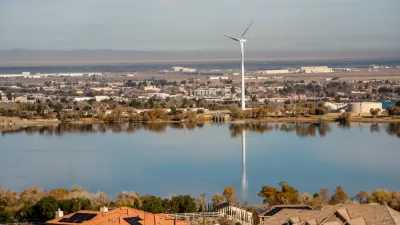Architect Peter Calthorpe lays out a forceful argument for the lower costs and higher benefits of constructing high speed rail versus expanded highways to serve the state's growing population and economic development.
According to Calthorpe, "California's 520-mile-long high-speed rail would connect north and south for half the dollars that otherwise would be needed for highway expansion and new airport facilities. More significantly, it would become a catalyst for urban renewal, enhance local transit systems and generate market-wise development opportunities."
Perhaps most significant for the health of the environment and the state's residents, "In the transit-oriented development future, average vehicle miles traveled per household would be reduced 40 percent, the equivalent of taking 18.6 million cars off the road. There would be fewer roads and parking lots built, less runoff water to be cleaned and stored...Less driving means less air pollution and less associated respiratory diseases. More walking means healthier bodies and less obesity, affecting health costs.
FULL STORY: Why California needs high-speed rail

Planetizen Federal Action Tracker
A weekly monitor of how Trump’s orders and actions are impacting planners and planning in America.

Maui's Vacation Rental Debate Turns Ugly
Verbal attacks, misinformation campaigns and fistfights plague a high-stakes debate to convert thousands of vacation rentals into long-term housing.

San Francisco Suspends Traffic Calming Amidst Record Deaths
Citing “a challenging fiscal landscape,” the city will cease the program on the heels of 42 traffic deaths, including 24 pedestrians.

Amtrak Rolls Out New Orleans to Alabama “Mardi Gras” Train
The new service will operate morning and evening departures between Mobile and New Orleans.

The Subversive Car-Free Guide to Trump's Great American Road Trip
Car-free ways to access Chicagoland’s best tourist attractions.

San Antonio and Austin are Fusing Into one Massive Megaregion
The region spanning the two central Texas cities is growing fast, posing challenges for local infrastructure and water supplies.
Urban Design for Planners 1: Software Tools
This six-course series explores essential urban design concepts using open source software and equips planners with the tools they need to participate fully in the urban design process.
Planning for Universal Design
Learn the tools for implementing Universal Design in planning regulations.
Heyer Gruel & Associates PA
JM Goldson LLC
Custer County Colorado
City of Camden Redevelopment Agency
City of Astoria
Transportation Research & Education Center (TREC) at Portland State University
Jefferson Parish Government
Camden Redevelopment Agency
City of Claremont





























